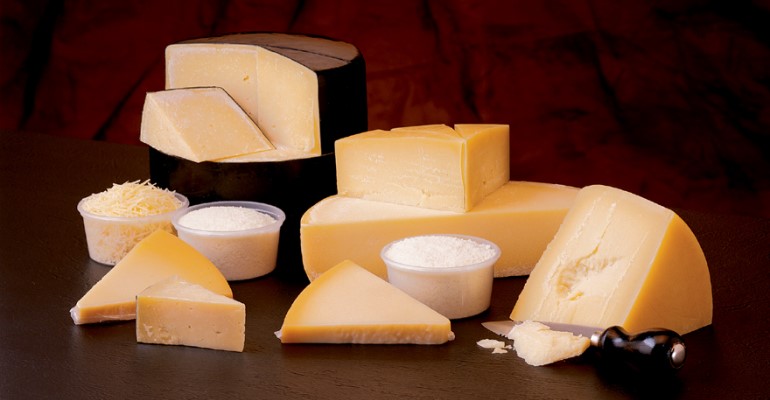Congressional letter seeks to protect common food names
Ag and farm groups praise letter from 111 members of Congress seeking protection of generic food names in future trade discussions.
November 2, 2020

In an effort to ensure that American farmers and food producers continue to have access to fair trade rules and the movement of products overseas, 111 members of the House signed onto a letter calling on the Administration to protect common food and wine terms in future trade discussions.
The letter asks the U.S. Trade Representative and the U.S. Department of Agriculture to make safeguarding common food and wine terms a core policy objective in all current and future trade negotiations. The effort was led by Reps. Jim Costa (D., Cal.), Jodey Arrington (R., Texas), Angie Craig (D., Minn.), Dusty Johnson (R., S.D.), Ron Kind (D., Wis.), Mike Gallagher (R., Wis.), Jimmy Panetta (D., Cal.) and Mike Kelly (R., Pa.).
"American famers and food producers are hurting like never before, and we must take steps to protect access to key markets,” said Costa, who serves as chairman of the House Agriculture Committee’s livestock and foreign agriculture subcommittee. “By requiring protections for common food and wine terms in any trade negotiations, we can ensure they continue to have reliable and fair access to overseas markets, which are critical to their economic health."
The letter underscores concerns the European Union misuses protections meant for geographic indicators (GIs) -- which describe specialized products from specific regions, such as bologna, parmesan, chateau and feta -- to enact unjustified trade barriers to block U.S. exports and advocates for a consistent trade policy that prioritizes specific market access assurances for these products in all trade-related discussions.
A coalition of leading farm and agricultural groups applauded the letter.
“Congress has spoken loudly; it is time for stronger action by the U.S. government. For far too long, Europe has used unjustified trade barriers to block competition from high-quality American-made cheese, meat and wine exports. Europe is undermining global trade rules and weakening intellectual property system protections internationally. Today’s letter is an important reminder that we must raise the bar in our efforts in order to prevail in creating agricultural trade policy that works for the world, not just the European Union,” said Jaime Castaneda, executive director of the Consortium for Common Food Names.
“The EU’s ban on common cheese terms has already impeded U.S. dairy exports, but even more severe consequences for our industry lie ahead if the EU is allowed to continue these unfair trade practices,” U.S. Dairy Export Council president and chief executive officer Tom Vilsack said. "Preserving export opportunities for American-made cheeses and other products labeled with common terms must take priority in all future trade negotiations. I applaud Congress and the leaders of this effort for setting this important precedent in defense of American-made exports."
“Creating false barriers to block exports denies families around the world the high-quality food America’s farmers and ranchers produce. It’s trade manipulation. We applaud the U.S. government for its efforts to remove unfair trade practices that keep our nation from competing in the global marketplace,” American Farm Bureau Federation president Zippy Duvall said.
“The European Union has for too long unjustifiably and erroneously attempted to restrict trade in common food name products, including meat exports from the U.S.,” North American Meat Institute CEO Julie Anna Potts said. "The policy advocated in the bipartisan letter sent today to USDA and USTR will advance critical safeguards for common food name products in international trade and will enable America’s meat and poultry packers and processors, agricultural producers and food manufacturers to compete on a level playing field with their counterparts in the EU. We thank members of Congress for their leadership, and we stand ready to work with the Administration to defend against anticompetitive and protectionist policies pursued by trading partners that serve only to impede U.S. meat and poultry exports."
National Association of State Departments of Agriculture CEO Dr. Barb Glenn noted that the organization's members "work tirelessly with the federal government to open new doors for agricultural producers around the world. We encourage the U.S. Trade Representative and U.S. Department of Agriculture to amplify the importance of common food and wine terms as a core policy objective to successful free trade negotiations in the future. Doing so will ensure consumers are able to access the full bounties of our farmers and ranchers around the world.”
“America’s dairy farmers have been unduly harmed by the EU’s efforts to limit market opportunities for U.S. dairy products,” Jim Mulhern, president and CEO of the National Milk Producers Federation, said. "For years, the EU has sought to ban high-quality American-made cheeses, putting U.S. dairy jobs at risk and limiting economic growth in the rural communities that rely on a healthy dairy industry. I appreciate the important work being done by Congress to ensure that U.S. trade negotiators must have all necessary tools at their disposal to fight back against the EU’s destructive agenda."
“We have watched time and again as the EU has gone well beyond protecting legitimate GIs to erect trade barriers that benefit their own producers at our expense. The recent EU-China agreement on GIs is a perfect example of how the EU abuses GIs for their own gain. The U.S. must do more to ensure a level playing field for common food names, grape varietal names and traditional terms, and we are grateful to these representatives for supporting this effort,” Wine Institute president and CEO Bobby Koch said.
In July, 61 senators sent a similar letter requesting that the U.S. government enhance protections for common food and wine terms.
You May Also Like



